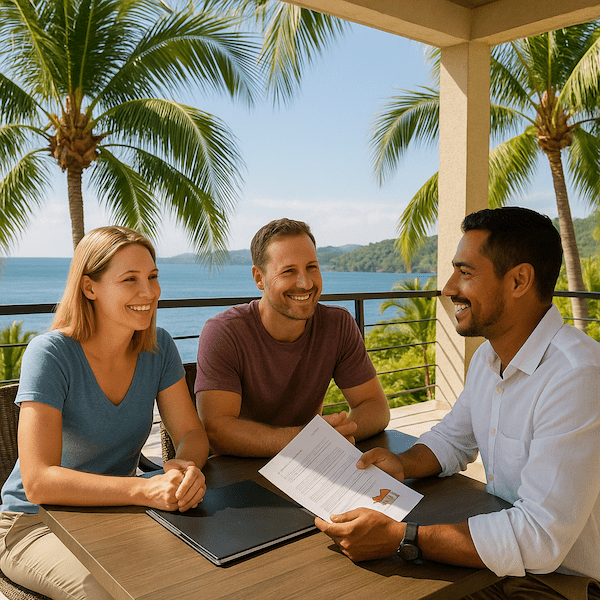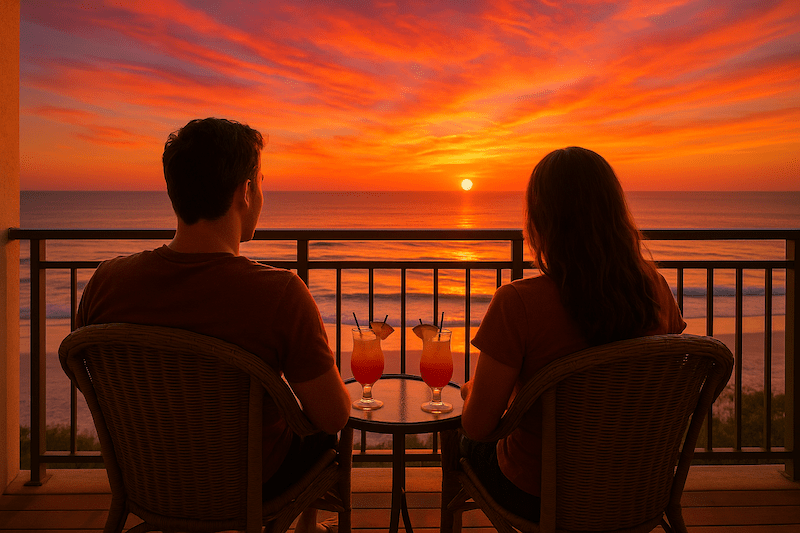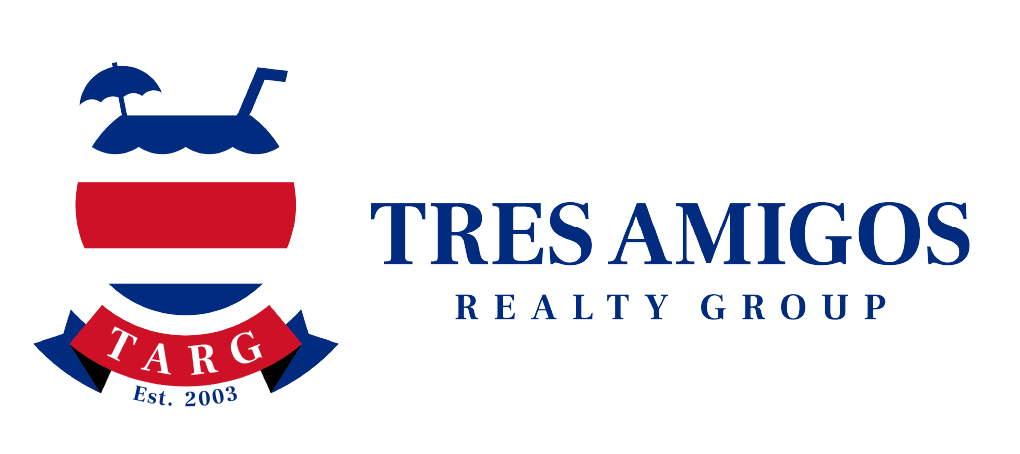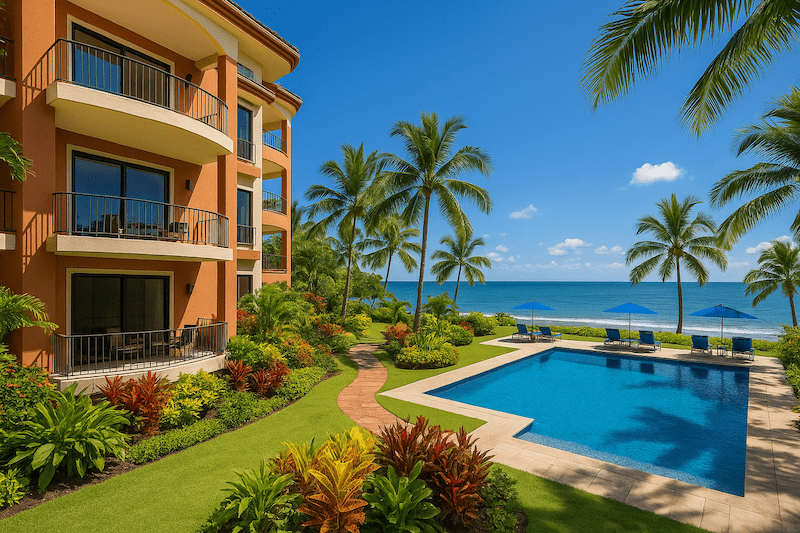1. Can Canadians Own Property in Costa Rica? Yes — Here's How
Yes, Canadians can absolutely own property in Costa Rica — with full property rights that are equal to those of Costa Rican citizens. Foreigners, including Canadians, may own land outright in their personal name or through a Costa Rican corporation. The only restriction is on concession land within the Maritime Zone (the first 200 meters from the high tide line), where foreign ownership is limited to 49% and a local partner is required. Most titled residential properties in the Papagayo region are outside this zone and fully available to Canadian buyers.
Property ownership is protected under Costa Rica’s constitution, and title transfers are formalized through a public notary and recorded in the national registry. As long as the due diligence process is followed properly, Canadians can invest confidently in Costa Rican real estate.
2. Why So Many Canadians Choose the Papagayo Region
The Papagayo region is one of the most Canadian-friendly parts of Costa Rica. Located in the Guanacaste province, this area includes Playas del Coco, Playa Hermosa, Playa Panama, Playa Ocotal, and nearby beaches like Matapalo. It offers dry tropical weather, modern infrastructure, and easy access to the Daniel Oduber International Airport (LIR) — which has direct flights from Toronto, Montreal, Calgary, and Vancouver during peak season.
Beyond the practical advantages, Canadians are drawn to Papagayo’s relaxed pace, welcoming community, and mix of locals and expats. Whether you’re retiring, investing, or planning part-time living, this region provides a stable environment with real growth potential.
3. What Types of Property Are Available in Papagayo?
Papagayo offers a wide range of real estate options. Condos are especially popular among Canadian buyers looking for turn-key vacation homes with rental potential. These can be found in gated communities with pools, ocean views, and property management services.
Single-family homes and villas are also common, with price points ranging from under $300,000 to multi-million dollar estates in areas like the Papagayo Peninsula. For those interested in building, there are titled lots available — often with utilities in place and flexible zoning.
4. Can Canadians Get Financing in Costa Rica?
Traditional bank financing is available in Costa Rica, but it can be more challenging for foreigners. Interest rates are typically higher than in Canada, and local banks often require more documentation, such as proof of income and legal residency status.
That said, many Canadians purchase using cash or seek financing alternatives such as:
- Financing through a Canadian home equity line of credit (HELOC)
- Seller financing, which is sometimes offered by motivated owners or developers
- Private lenders based in Costa Rica or abroad
 5. What Legal Requirements Should Canadians Know?
5. What Legal Requirements Should Canadians Know?
The most important part of any real estate purchase in Costa Rica is hiring a reputable real estate attorney. Your lawyer will perform due diligence on the title, verify that the property is free of liens or encumbrances, and ensure that zoning laws are respected.
Most Canadian buyers choose to purchase through a Costa Rican corporation (Sociedad Anónima or S.A.) for privacy, asset protection, and easier inheritance planning. However, it’s also possible to own property in your personal name.
6. Resale Value and Liquidity: What to Expect
The Papagayo region has shown steady appreciation, particularly in well-located areas like Playas del Coco and Playa Hermosa. While Costa Rica’s real estate market is not as liquid as in Canada, demand from U.S. and Canadian buyers provides stability and a healthy resale market — especially for well-maintained properties priced correctly.
Buyers should work with an experienced local agent who understands resale timing, seasonal trends, and how to position a property for North American buyers.
7. Property Taxes and Ongoing Ownership Costs
Costa Rica has remarkably low property taxes — just 0.25% annually on the registered value of the property. For example, a $300,000 home incurs just $750 in annual taxes. If the property is held in a corporation, there’s also a nominal corporate tax (under $200 USD/year).
Additional costs to consider:
- HOA fees for gated communities (varies widely)
- Annual legal fees if a corporation is used
- Utilities, insurance, and maintenance
8. Renting Out Your Property in Costa Rica
Many Canadians offset costs or earn income by renting out their property when not in residence. Short-term vacation rentals are allowed in most areas of Papagayo, and platforms like Airbnb and VRBO are widely used.
Work with a local property manager to handle bookings, cleaning, and guest communication. Note that rental income is taxable in Costa Rica, and you’ll need to register with the tax authority (Hacienda). Your lawyer or accountant can assist with this process.
9. Residency Options for Canadians Buying Property
Owning property in Costa Rica does not automatically grant residency. However, if you invest at least $200,000 USD in real estate, you may qualify for the Investor Residency category (Inversionista). This allows you to live in Costa Rica and renew your residency every two years.
Many Canadians begin with tourist stays (up to 90 days) and later apply for residency once they’re ready for longer-term living. Legal residency also makes banking, vehicle ownership, and health insurance access easier.
10. Tips for a Smooth and Successful Buying Process
- Work with a trusted local agent: Choose an agent familiar with expat buyers and the Papagayo market
- Use a qualified attorney: Never skip the legal due diligence process
- Visit before buying: Spend time in the area and explore properties in person
- Understand your goals: Are you buying for investment, lifestyle, or retirement? Each path has its own considerations.
11. Final Thoughts

Canadians can absolutely own and enjoy property in Costa Rica — with full legal rights and strong opportunities in the Papagayo region. Whether you’re planning a second home, a rental investment, or a full relocation, the key is to work with knowledgeable local professionals who can guide you through the process.
To start your property search in Playas del Coco, Playa Hermosa, Playa Panama, or nearby areas, explore listings here






